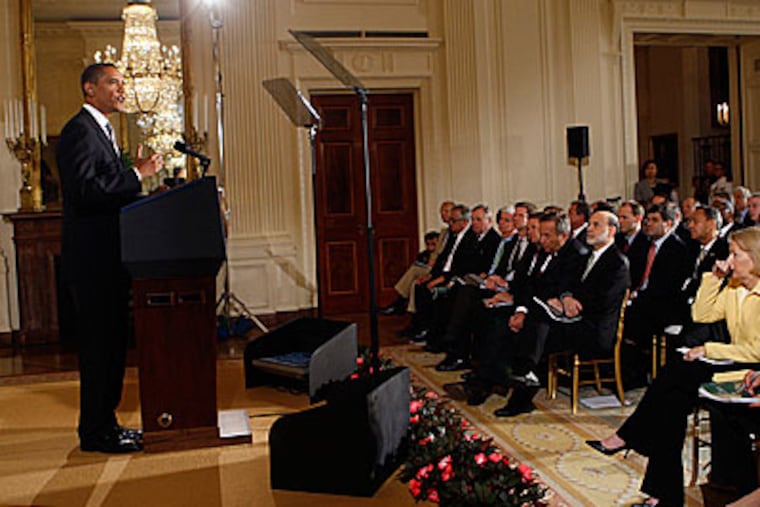Editorial: Banks need tough love
President Obama is on the right track with his proposal for greater regulation of Wall Street, but a more muscular plan may be needed to prevent another financial collapse.

President Obama is on the right track with his proposal for greater regulation of Wall Street, but a more muscular plan may be needed to prevent another financial collapse.
The need for more effective oversight of the financial industry is clear. The titans of investment banking risked too much on shaky mortgage-backed securities. They didn't make sure they could cover potential losses. But neither the Securities and Exchange Commission, nor the Federal Reserve, nor a host of other government regulators did much to prevent the calamity.
The result was an emergency $800 billion taxpayer bailout of the banking industry last fall, coupled with shareholders' losses of at least $8 trillion in the stock market. Quick action by the federal government prevented a total meltdown, but taxpayers will be burdened with the fallout for decades to come.
Faced with cleaning up the mess, Obama has proposed a wide-ranging overhaul of the financial regulatory system. He would address nearly every aspect of the industry, from those diabolical credit-default swaps to what to do about institutions that are deemed "too big to fail."
The president's plan would give the Federal Reserve new regulatory powers, create a new agency to protect consumers, and give the federal government authority to take over failing investment banks. He also would make trading of derivatives more transparent.
Obama's approach is to mend the current system, rather than to bring in a wrecking ball and start over. It's a relatively cautious strategy, perhaps cognizant of the concern that the federal government has already become too involved in private industry.
But questions remain about whether this plan will change Wall Street's bad habits.
Obama and Treasury Secretary Timothy Geithner, a former Fed official, want the central bank to take on the new responsibility of regulating large financial institutions whose failure would threaten the overall economy. Yet it was the Fed that failed to detect quickly or respond effectively to the risks posed by the housing bubble.
Also, the Fed traditionally has been a secretive agency, its decisions hidden from public view. Lawmakers in both parties are pushing for audits of the Fed and more openness, scrutiny that should come with expanded authority.
Obama's overhaul also would create a Financial Services Oversight Council to target emerging risks to the economy. Geithner would lead the panel, which would include the Fed chairman and other regulators.
Geither told lawmakers Thursday that the Fed would be the best single agency to react quickly in a crisis. But Congress also needs to assess whether this plan would have the Federal Reserve give up its independence and compromise its role as the establisher of monetary policy.